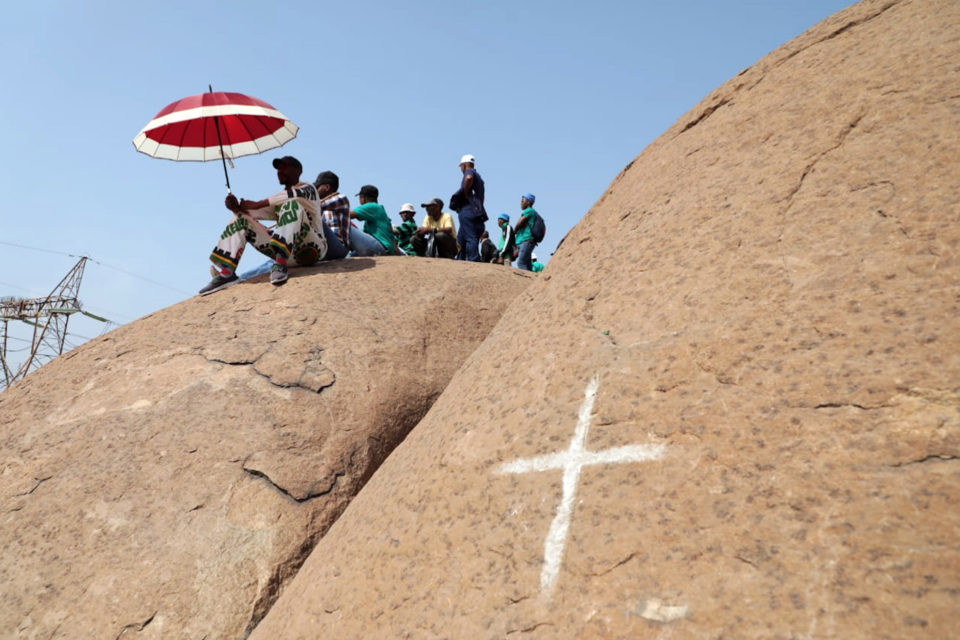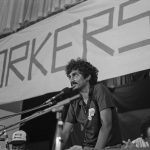State action to deregister Amcu is undemocratic
Despite the questionable internal democratic practices of the mineworkers’ union, state attempts to deregister it can be ascribed only to political motives.
Author:
30 April 2019

May Day began its life as a spring festival celebrated in the ancient forests that covered much of Europe. People and homes were adorned with sprigs, blossoms and garlands. Bonfires were lit, Maypoles erected and there was drinking, dancing and carousing. It was a jol.
But the festival did not sit well with the rise of capitalism, which was accompanied by attempts to contain popular autonomy, dispossess people of their land and venerate work as a key moral virtue. After the witch-hunts that wracked Europe in the 15th century, and the rise of the English Puritan movement from the 16th century, the festival was forced underground and acquired a dissident character.
It crossed the Atlantic with English colonialism where, by the early 1800s, it had been taken up by African Americans in New Orleans. It first became associated with workers when, on 1 May 1886, 400 000 workers, including women, migrants and African Americans, went on strike across the United States to demand an eight-hour day.
On 3 May that year, the police killed two striking workers in Chicago. A meeting was called in Haymarket Square for the following night. The violence continued and seven police officers and six workers were killed, and more than 70 workers injured. When four workers were hanged after a rigged trial, more than 200 000 people lined the route from their funeral.
In 1889, the Second International, a collection of socialist and labour parties, declared May Day as International Workers’ Day at a meeting in Paris on the centenary of the French Revolution. In April 1912, striking miners were shot down in Siberia and on May Day that year, hundreds of thousands of workers went on strike across the country in protest at the massacre. The following year, Rosa Luxemburg wrote: “The brilliant chief idea of the May Day celebration is the independent action of the proletarian masses.”
Dissident energy
In South Africa, the declaration of May Day as Workers’ Day, a public holiday in celebration of labour, comes to us via the black trade union movement, which rebuilt itself from the Durban strikes in 1973. By the early 1980s, the debates in and around the trade union movement about the wisdom of organising workers under the authority of a nationalist movement had taken on a real intensity.
In 1985, the launch of the Congress of South African Trade Unions (Cosatu) at Curries Fountain in Durban successfully brought the bulk of the union movement under the authority of the ANC. The members of the unions affiliated to the new federation began refusing to work on 1 May from 1986, and called for the declaration of May Day as a public holiday. Under apartheid, the collective refusal to work on May Day took on an electric dissident energy. In 1989, anti-apartheid academic David Webster was assassinated on May Day.
After the end of apartheid, May Day became an official public holiday, which the ruling party used to legitimate itself to the working class, rather than to affirm “the independent action of the proletarian masses”.
Related article:
But the ruling party’s domination of the industrial parts of the union movement came to an end with the massacre in Marikana in 2012. Following the massacre, there was, across the mines, a massive defection away from the ANC-aligned National Union of Mineworkers to the Association of Mineworkers and Construction Union (Amcu).
The following year, the largest union in the country, the National Union of Metalworkers of South Africa (Numsa), took a decision to build a socialist movement outside of the ANC. In 2014, Numsa was expelled from Cosatu, which now largely represents government employees rather than the industrial working class.
The ANC, conflating itself with the nation as a whole, has frequently responded with patently undemocratic hostility to forms of organisation outside, in full or in part, of its authority. In the 1980s there was, for instance, significant hostility towards the Black Consciousness Movement. Anti-apartheid activist Steve Biko was sometimes described as a “CIA agent”.
Significant forces in the ANC did not take kindly to the compelling call to conscience that emerged from HIV and AIDS activist organisation the Treatment Action Campaign (TAC) in the late 1990s. The old paranoia about foreign manipulation was resuscitated, and the National Association for People Living with HIV and AIDS (Napwa) was set up as a more palatable rival to TAC.
Anti-democratic impulses
The emergence of shack dwellers’ movement Abahlali baseMjondolo in 2005 was also frequently understood in paranoid terms about foreign plots. The movement was subject to sustained repression from the outset and, in 2009, attacked in the Kennedy Road settlement in Clare Estate, Durban, by armed men explicitly identifying as ANC supporters while the police refused to intervene.
Following the attack, then provincial minister for safety and security Willies Mchunu and the provincial police commissioner at the time, Hamilton Ngidi, issued a statement declaring that the settlement had been “liberated”. Mchunu later told the media that the government had taken a decision to “disband” the movement. Since then, a number of attempts – all failed – have been made to set up ANC-aligned alternatives to Abahlali.
The workers massacred at Marikana in 2012 were acting independently from union structures. But in the wake of Amcu’s explosive growth after the massacre, then President Jacob Zuma, along with the State Security Agency, was personally involved in the creation of the Workers Association Union as an intended rival to Amcu. The fact that this project was a complete failure should not distract us from the anti-democratic impulses that motivated it.
Given the ANC’s history of intolerance towards independent popular organisation, the recent announcement by the Registrar of Labour Relations that the Labour Department intends to deregister Amcu on the grounds that it is “not a genuine trade union” will, for good reason, be widely read as a political attack rather than an expression of a genuine concern with the internal democratic practices of trade unions.
Union singled out
Amcu certainly has real questions to answer about its internal democratic practices. But this is true of many other trade unions, and few will believe that Amcu is not being singled out for political reasons.
Moreover, the ANC itself, particularly in some regions and branches, does not consistently conduct itself according to its own rules or generally accepted democratic practices. In some parts of the country, ANC members are plainly involved in political violence. In Durban, two of its councillors have been convicted and imprisoned for the assassination of a grassroots activist. But it is, of course, unthinkable that the party would be shut down by the state on this basis.
Amcu’s limits as a trade union are well known. But it also has more than 200 000 members and is a significant organisation on the mines. Whatever one may think of its tactics, it is undeniably disruptive of both the ANC’s failed attempts to restore its influence over mineworkers and the everyday functioning of capital. It seems highly likely that these facts are more than a little salient to the attempt to deregister the union.
As we head towards May Day, it is imperative that, as a matter of principle, all progressive forces oppose the state’s attempt to deregister Amcu. Of course, this imperative should not preclude serious questions being asked of Amcu’s practices.

